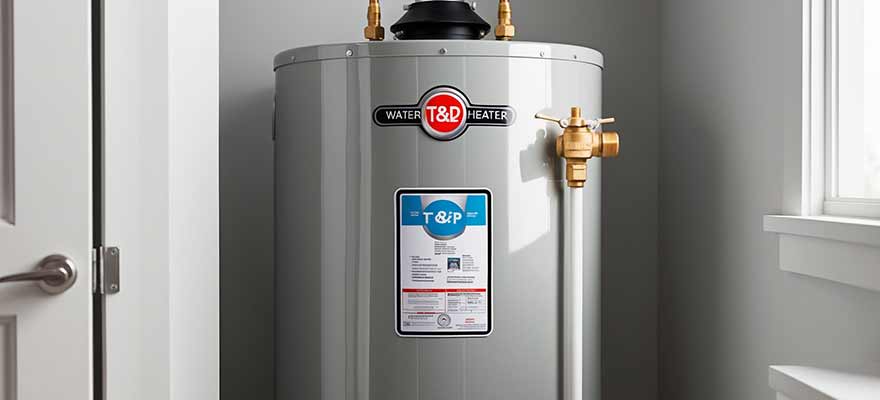Can a Water Heater Explode if Turned Off? Risks and Safety Tips
The idea of a water heater exploding might sound extreme, but it’s a question that sparks genuine concern for many homeowners. Water heaters are essential, yet they’re also powerful appliances that heat water and build pressure—two factors that, if unchecked, can cause problems.
So, if you’ve turned off your water heater, can you ignore the risk of an explosion?
Understanding how water heaters work, even when switched off, can help clear this worry and keep your home safer.
Is an Explosion Possible if the Water Heater Is Turned Off?
When a water heater is turned off, the risk of explosion is significantly reduced but not entirely impossible. Most danger associated with water heaters comes from high pressure and heat buildup within the tank. When the heater is off, there’s no active heat source, which means no added pressure from ongoing heating.
However, if residual pressure or a malfunction in the temperature and pressure relief (T&P) valve occurs, a problem could still occur. Over time, issues like sediment buildup or a compromised tank structure can also increase risks, even if the heater isn’t actively heating.

A water heater with a focus on the T&P valve, which is essential for preventing pressure buildup and reducing explosion risks.
Main Causes of Water Heater Explosions
High Pressure from Faulty T&P Valve
The T&P valve is a crucial safety feature. It releases pressure if it builds up to dangerous levels. If the valve malfunctions or is blocked, excess pressure may remain trapped in the tank, increasing the risk of an explosion.
Sediment Buildup Inside the Tank
Over time, minerals and sediment accumulate at the bottom of the tank, especially in areas with hard water. This buildup can insulate the tank’s bottom, causing it to overheat and potentially weakening its structure.
Corrosion and Rust Compromising the Tank
Corrosion can weaken the tank’s metal structure, creating vulnerabilities that make it more prone to failure. Tanks without a properly maintained anode rod are at a higher risk of rust, which could lead to leaks or, in rare cases, rupture under pressure.
Thermostat Malfunction
If the thermostat fails and causes the water to overheat, the increased temperature can create pressure buildup, even if the heater isn’t heating. This can occur if the thermostat doesn’t properly regulate the temperature, leading to overheating risks.
Improper Installation or Maintenance Neglect
An incorrectly installed water heater or one lacking regular maintenance may have various safety risks, from faulty valves to sediment and corrosion issues that could be prevented.
Signs Your Water Heater May Be at Risk of Explosion
- Strange Noises: Rumbling, popping, or banging sounds often indicate sediment buildup, which can trap heat and increase pressure.
- Visible Rust or Corrosion: Rust on the tank or pipe connections signals corrosion, which weakens the tank and raises the risk of leaks or rupture.
- Leaking Around the T&P Valve: If the T&P valve releases water, it’s a sign of excess pressure. A faulty valve or buildup in the tank could be the cause.
- Water Temperature Fluctuations: Inconsistent water temperatures may indicate a thermostat issue, leading to overheating and increased pressure.
- Unusual Odors or Gas Smells: A gas odor around the heater could indicate a leak, requiring immediate safety attention.
Safety Tips to Prevent Water Heater Explosions
Inspect the T&P Valve Regularly
Test the temperature and pressure relief (T&P) valve every six months to ensure it’s functioning. Lift the lever slightly and release; it should allow water to flow briefly, then stop. If it doesn’t, consider replacing it.
Flush the Tank Annually
Drain your water heater tank yearly to remove sediment buildup. This helps prevent overheating and maintains the heater’s efficiency.
Check for Corrosion and Rust
Look for signs of rust or corrosion on the tank and pipe connections. Regularly inspecting and replacing the anode rod can help prevent corrosion inside the tank.
Monitor Water Temperature Settings
Set your water heater thermostat to around 120°F. Higher temperatures increase pressure and stress on the tank, leading to potential risks.
Schedule Professional Maintenance
Arrange a yearly inspection with a professional to assess components like the thermostat, control valves, and T&P valve. A licensed technician can detect issues early and ensure everything is working safely.
Keep Your Water Heater Safe From Explosions With Professional Inspections
A well-maintained water heater is essential for both safety and efficiency, but there are times when professional attention is necessary. Signs such as strange noises (rumbling or popping sounds), visible rust or corrosion on the tank, or leaks around the temperature and pressure (T&P) valve indicate professional inspection service. Inconsistent water temperatures or gas odors are also red flags, signaling potential thermostat malfunctions or leaks that could pose safety risks.
Even without obvious issues, scheduling a yearly inspection proactively prevents buildup, corrosion, and other potential hazards. To ensure optimal function, professional technicians can assess components like the thermostat, T&P valve, and tank structure.
If your water heater shows signs of trouble or needs an annual check-up, contact Gwinnett Plumber Pro in Lawrenceville, GA. We’re available 24/7 to provide inspections and reliable water heater services whenever you need them.
Call (706) 224-1385 to learn more.

